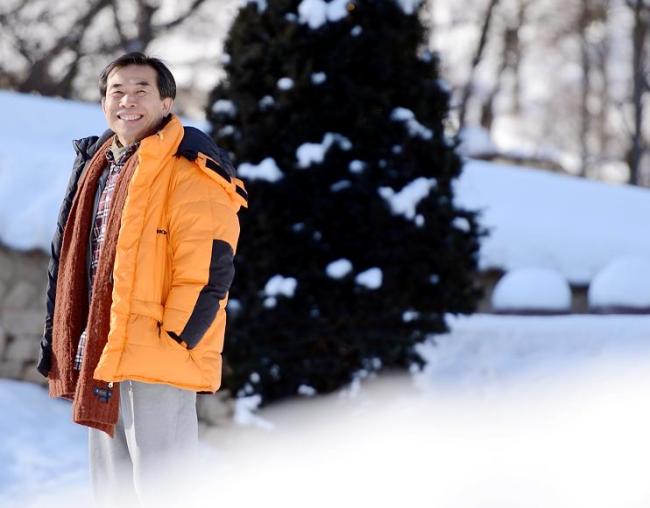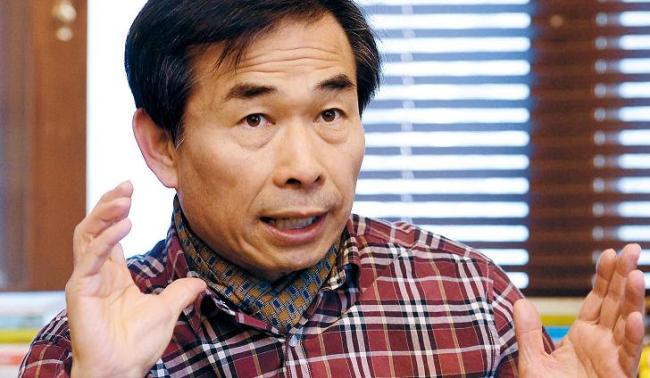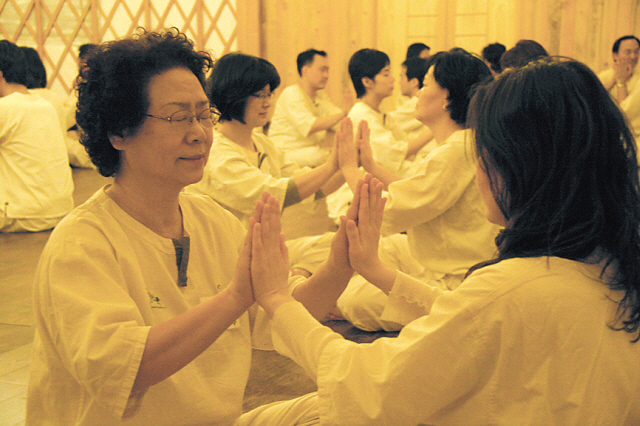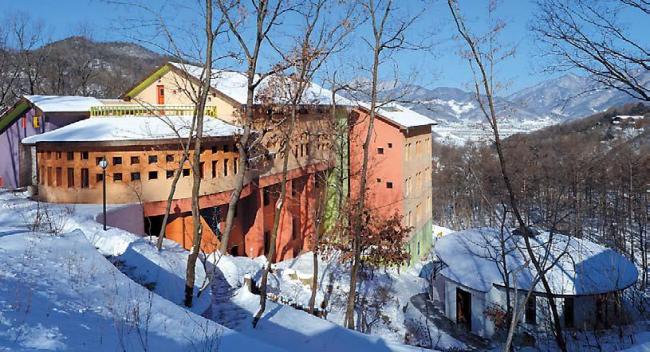 |
Go Do-won enjoys the view at Godowon Healing Center in Chungju, North Chungcheong Province, Jan. 3. (Ahn Hoon/The Korea Herald) |
CHUNGJU, North Chungcheong Province ― Located in Chungju, North Chungcheong Province, Godowon Healing Center is a serene place, a rarity these days. Surrounded by mountains and trees, it is where people meditate, eat what’s healthful, and go for slow walks in the hope of clearing out what is cluttering their mind.
It may be hard to believe, but the center’s famous director, Go Do-won, used to be a very busy man. He enjoyed a prolific career as a journalist and as a speech writer for late President Kim Dae-jung, until his health began to fail in 2001. It would have been no exaggeration to call him a workaholic in those days.
“I only took three days off during my five-year term as President Kim’s speech writer,” Go tells The Korea Herald.
The 60-year-old now spends most of his time at his meditation center, where he greets a few hundred visitors every day. His famous “Morning Letter” brings him many fans, many of them young visitors, who bring him a piece of paper and shyly ask for his autograph. He had never imagined the kind of life he enjoys now, though it still lets him do what he has always done: read, write, and share his knowledge. Even after accomplishing so much, however, Go still dreams big.
“I want to reach out to the international readers someday,” he says.
Go is best known for his “Morning Letter,” a special project that he started in August 2001. For the past 12 years, the former journalist has been sending emails to his subscribers every morning, each of them consisting of a quote from a book as well as a short message written by him.
 |
Go Do-won speaks during an interview with The Korea Herald at Godowon Healing Center in Chungju, North Chungcheong Province on Jan. 3. (Ahn Hoon/The Korea Herald) |
 |
Participants meditate at Godowon Healing Center. (Godowon Healing Center) |
“I wanted my letters to be the first thing the readers would read after they woke up,” Go says. “Just like how many people pick up their newspapers first thing in the morning.”
The first email, sent on Aug. 1, 2001, was received by a few hundred people, mostly Go’s friends and reporters he had worked with. Now, his letters have 3.13 million subscribers nationwide. In 2010, he opened the meditation center in Chungju with funds raised by his avid online readers.
In 2001, Go’s health was arguably the worst it had ever been: His arms were paralyzed, while he could not move his neck. To improve his condition, Go started marathon training. Running helped him regain his physical health, but his mind was still uneasy. That’s when he went to his vast collection of quotes from all kinds of books he had read ― ever since he was a kid.
“It’s a habit of my father that I inherited,” Go says. “When I was in middle school, my father would make me read a book and highlight all the ‘important sentences.’ At first, I’d just highlight random ones, because I had no idea what was important and what was not. Eventually, this led me to write down the quotes that touched me whenever I read a book.”
 |
The view of Godowon Healing Center (Ahn Hoon/The Korea Herald) |
In his first email, Go wrote about hope. He wrote about it through the words of Lu Xun, one of the most prominent Chinese writers of the 20th century. He found comfort by revisiting Lu’s sentences; Go read Lu Xun’s text for the first time when he was in his 20s, when “no company would even accept his resume” after being expelled from university. He had been arrested for his writings for a student newspaper during the authoritarian regime in the ‘70s.
Go later found a job as a writer for a local magazine, and eventually became a politics beat reporter for the Joongang Ilbo, one of the major dailies here. He became President Kim’s speech writer in 1998.
“Hope cannot be said to exist, nor can it be said not to exist,” he wrote down Lu’s famous quote, the quote that gave him hope. “It is just like roads across the earth. For actually the earth had no roads to begin with, but when many men pass one way, a road is made.”
Born in Jeonju, North Jeolla Province, Go had to move 17 times throughout his childhood. His father was a Protestant pastor who was dedicated to establishing churches in remote areas of the Jeolla provinces.
“I’ve been to pretty much everywhere in the province of North Jeolla,” he says. “I’ve been to port towns and mountain towns. My father found a total of seven churches in different locations.”
Go grew up watching his father reading and writing his sermon for the services. Go helped whenever his father had to build a new church, using dirt, stone and a shovel. During worship services, Go always sat in the front row, listening to his father’s sermon while studying the reaction of the church members. His father in fact wanted Go to become a pastor, a well-read one at that.
“My childhood experience with my father really helped me during my years as a speech writer for President Kim,” Go says. “I understood the loneliness of leadership at an early age.”
Things weren’t always great between his parents. His mother was furious whenever her husband brought his newly purchased books home; she thought it was absurd to buy books when there was not enough money in the house.
“What fascinated me was he would manage to look as if nothing had happened during his church services, after going through those fights with my mother,” Go says.
“He once told me, it can be done when one decides to act like a duck. Ducks manage to look clean, even after being in the mud, after two or three shrugs. Although your reality is fighting with your spouse almost every night, you have to put on a brave face and pretend that it is not affecting you. You just continue doing what you have to do for the people you are responsible for.”
Shortly after he started his “Morning Letter,” Go was introduced to the world of meditation. By meditating, he learned to concentrate in critical moments, such as a moment of anger or frustration, and turn negative emotions into positive ones. Those concentration techniques often remind Go of his father, who seemed to be capable of it especially in front of his audience.
“Anger is a strong emotion and so is passion,” Go says. “They can be very similar and switched to one another. I learned to appreciate spiritual values and what’s invisible, whereas I used to be very ambitious and career oriented.”
One of Go’s role models is Abraham Lincoln, the 16th president of the United States. He sees a lot of similarities between his life and Lincoln’s ― neither had much while growing up, yet both found hope in reading.
The Godowon Healing Center’s English-learning camp for children is therefore named after Lincoln. Its program includes reading Lincoln’s famous speeches, as well as writing one’s own speech in English and delivering it in front of a crowd.
“My dream is to send the morning letters in English to readers overseas,” says Go. “I don’t want my morning letters to be exclusively a Korean cultural product. I wish to share them with as many people as possible.”
By Claire Lee (
dyc@heraldcorp.com)









![[Herald Interview] 'Trump will use tariffs as first line of defense for American manufacturing'](http://res.heraldm.com/phpwas/restmb_idxmake.php?idx=644&simg=/content/image/2024/11/26/20241126050017_0.jpg)
![[Exclusive] Hyundai Mobis eyes closer ties with BYD](http://res.heraldm.com/phpwas/restmb_idxmake.php?idx=644&simg=/content/image/2024/11/25/20241125050044_0.jpg)
